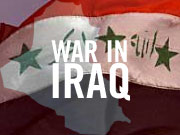St. Paul, Minn. — It's not always easy to find help. That's what Sharon Miners realized when her son, Tim, was deployed to Iraq with the Marines in 2003.
"What we found is the Marine Corps has bases with the Marines and their families, and a lot of them are married, so the family readiness is given to their wives or the soldiers themselves on the bases," Miners says. "But moms and dads way back in the states, nowhere near where the soldier lives, really don't have any resource."
Miners posted a notice on an Internet Web sitem hoping to form a support group for Marine family members in Hennepin County.
The group never materialized, and she ended up finding a support group for families of deployed service people at North Heights Lutheran Church. Miners says it has been meaningful for her to to pray with the other military families. Even though her son is now back from his second tour in Iraq, she still attends the church support group.
And Miners hasn't removed her posting from the Internet.
"I remember the need to share information about my feelings about my son being in Iraq, and the need for support, and really not knowing where to find that support. So I thought that I would leave my name on the Internet, so that if some people contacted me, I could refer them on," Miners says.
Support can be somewhat scattered in other branches of the military, too. Technical Sgt. Jeffrey Williams of Minnesota's Air Force Reserve says his unit offers access to chaplains for one-on-one counseling.
But he says overall, his unit has limited resources since it doesn't run an active duty base, so it often refers family members to outside groups for counseling services.
"We have probably better access to more established programs outside of our unit, through the Red Cross or First Call for Help or Military One Source, that it's easier to outsource that," Williams says. "And it ensures that the person in need has a better range of options in care for whatever the situation is."
Sometimes military family members form groups on their own. That's how it worked for Katie Overland. Her husband, Maj. Gen. John Overland, was deployed to Afghanistan about a year ago with the Army National Guard, and she and other Guard families came together.
Overland says the support group members are spread around the state; their monthly meetings and occasional e-mails and phone calls bring them closer.
"Because we don't live on a base or near a base, it's nice to talk, to be connected with other people who know what you're going through -- someone you can talk to, as well as being connected with resources, {since} some people might have financial trouble, some might have the birth of a baby," Overland says.
Overland says it's hard knowing her husband won't be around to spend the holidays with her and their three young kids. And sometimes her sadness is deepened by news of military casualties, like the recent deaths of three Minnesota Marines.
"That's heartbreaking," Overland says. "It's very hard to hear that. You are thankful it's not your own soldier, but your heart breaks for those families that are facing that. You know how close it is, that your soldier could be that soldier."
Overland says when she feels especially worried or overwhelmed, the counsel of her support group members can be soothing. She says they're always reminding her just to take things one day at a time.




